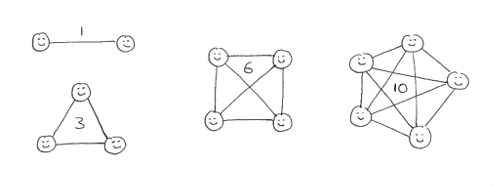I’ve worked in a number of different software development teams, and some of the best have been when I’ve been part of a team of 3 people. In this post I discuss some of the features of such teams, what helps them work well, what can harm them and my subjective experiences of working on such teams. I can’t say categorically that 3 is the optimum team size. Clearly, the right size of team is going to depend on many things. But if you happen to be on a team of 3, or you work with one, this might be helpful.
Teams of 3 Are Self-Organising
A long time ago, in a book I’ve long since forgotten, there was a diagram about team size and the number of communication channels required to keep each member informed. It looked something like this:

As the number of team members goes up, the number of communication channels increases exponentially.
